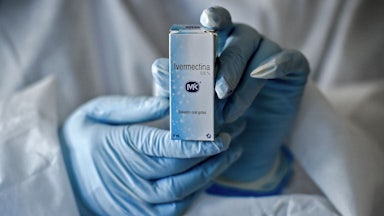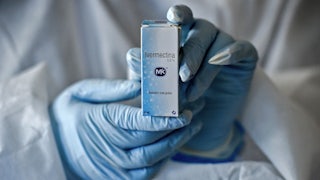There is already so much bad news about Covid-19 that no one needs to look very hard to find it. On Memorial Day, the United States was hovering around 25,000 new cases a day; on Labor Day, the figure is more than six times higher. The daily death total is about where it was last Thanksgiving. Deaths in Louisiana and Florida alone are outpacing those in the United Kingdom. More than 100,000 are hospitalized across the country. Not so long ago, it seemed we were on the verge of turning a corner—either to a return to normalcy, whatever that was, or the promise of a Bacchanalian summer. As we head into autumn, there’s little doubt that we are very much still in the teeth of the pandemic and that we may very well be for a long, long time.
The delta surge shouldn’t be this bad—and indeed isn’t in many other countries—and yet it is, largely because of politics. The Republican Party spent most of last year vehemently arguing that efforts to protect people from Covid-19 were a vast conspiracy aimed at unseating a president who had spent the previous four years being historically unpopular. The right has gone to extraordinary lengths to raise questions about a vaccine that has proven to be a life-saver and to limit the uses of masks, which have proven to be effective at limiting transmission. At the same time, various nonvaccine remedies—all of which are more dangerous and less effective than the vaccine—have been touted as alternatives. Intensive care units and morgues are full; overdoses of ivermectin, a dewormer used by both humans and livestock, have jumped 250 percent, from 133 to 459.
All of this is tragic and infuriating. But it’s also led to a certain slackness, in which fishy stories are spreading like wildfire. The latest instance happened over Labor Day weekend. KFOR, a local NBC affiliate in Oklahoma, reported that ivermectin overdoses were “backing up rural Oklahoma hospitals [and] ambulances” and that the backlog was so severe that even “gunshot victims were having hard times getting to facilities.”
That would be very bad if it were true. Imagine the scene: Overdoses of ivermectin cause a second, simultaneous pandemic, overloading ICUs in hard-hit states as part of an interlocking crisis. It was such a good story—guaranteed to drive traffic—that no one bothered to check it. This story was quickly picked up by other outlets, including Rolling Stone, The Guardian, Insider, and Newsweek. Rachel Maddow, the popular MSNBC host, tweeted it to her millions of followers.
Bullshit detectors should have been screeching with alarm. The KFOR story was based on an interview with a single doctor, who was not a full-time employee of the hospital, Northeastern Health System Sequoyah, about which he was offering testimonial. As was later clarified, he was part of a “medical staffing group that provides coverage for our emergency room.” Ivermectin has received an extraordinary amount of attention in recent weeks, but the doctor had not worked at the hospital in “over two months.”
Given the severity of what was being alleged, you would expect to hear from an official from the hospital itself. If gunshot victims were actually being turned away—itself a blaring siren—one would expect to hear from local politicians, as well. A final red flag: Why was this extraordinary epidemic of ivermectin overdoses limited to one hospital in rural Oklahoma? Either this was a huge story—a sign of a tidal wave of unsafe horse drug use—or something extraordinary was happening in a corner of Oklahoma.
But no one bothered to check or, even, to call. Concerns about the story were raised online shortly after it began to go viral, and yet faithful, uncritical write-ups and tweets started popping up all over the internet. Speed is the name of the game in aggregation, but in this case, the aggregators were missing the bigger story: That the viral report about ivermectin overdoses wasn’t actually true.
One of the strange things about the current abundance of Covid-19 reportage is that much of it resembles old-school service journalism. It goes without saying that humans taking veterinary products is a bad idea, especially when a safe and effective vaccine is available. There’s nothing wrong with steering people in the safest and most responsible direction.
But in the current environment, there’s lots of ethically questionable content getting into the mix. Many of these stories about people doing unsafe and stupid things spread among the already-vaccinated portion of the population and reinforce prior ideas about their political opponents—usually rural people who presumably voted for Donald Trump—all the while suggesting that deep down, they deserve whatever bad things happen to them. But rural conservatives haven’t cornered the market on vaccine hesitancy or misguided medical practices. One can warn about the dangers of taking ivermectin to treat Covid-19 without making patently false or absurd claims about a phantom population of straw men.
There was a troubling slowness to correct many of these false stories. Rolling Stone and The Guardian, to use two offending examples, updated their stories, which are both still up. (The Guardian’s now ends with a note that literally contradicts the doctor’s testimony above it: “NHS Sequoyah had not treated any patients due to complications related to taking ivermectin, including overdose.”) Maddow, meanwhile, left her tweet up and arguably dug in. On Tuesday, she tweeted, “Two OK hospitals have chimed in on this now—one saying they’ve had ivermectin patients in their ER ‘adding to the congestion’ caused by COVID, another saying they haven’t.” This is a far, far cry from the claim in the original, which was that hospitals were so crowded with horse-dewormer overdoses that patients with serious injuries had to wait to be seen by doctors. Maddow has essentially suggested there’s nothing to correct, since one Oklahoma hospital has treated patients for ivermectin use. Again: People are taking horse medicine, and that is very bad. But it is crucial for journalists to take time to actually understand what is happening, instead of rapidly circulating sensational but dubious claims.
During the Trump era, liberals and establishment figures successfully turned “disinformation” into a partisan tool: Making false claims was something Donald Trump did; spreading fake news something that Russia did to get him reelected. There’s no doubt that false news about the use of dewormer medicine is less egregious than spreading lies about the integrity of the 2020 presidential election. But it’s a reminder that fake news is hardly limited to the right. For mainstream and, particularly, liberal media this should be a stark reminder of the value of due diligence and checking sources. At the very least, make a phone call.








